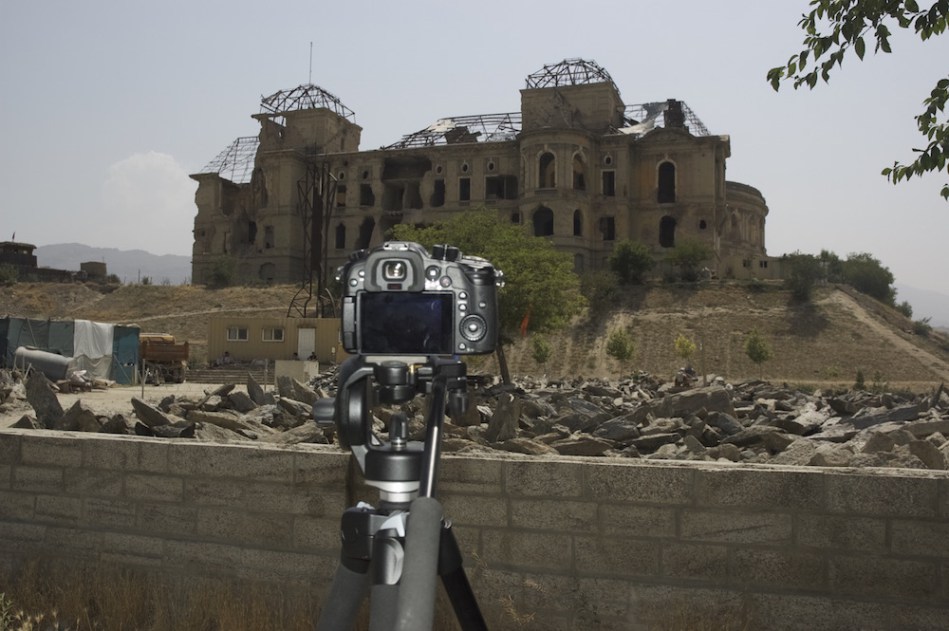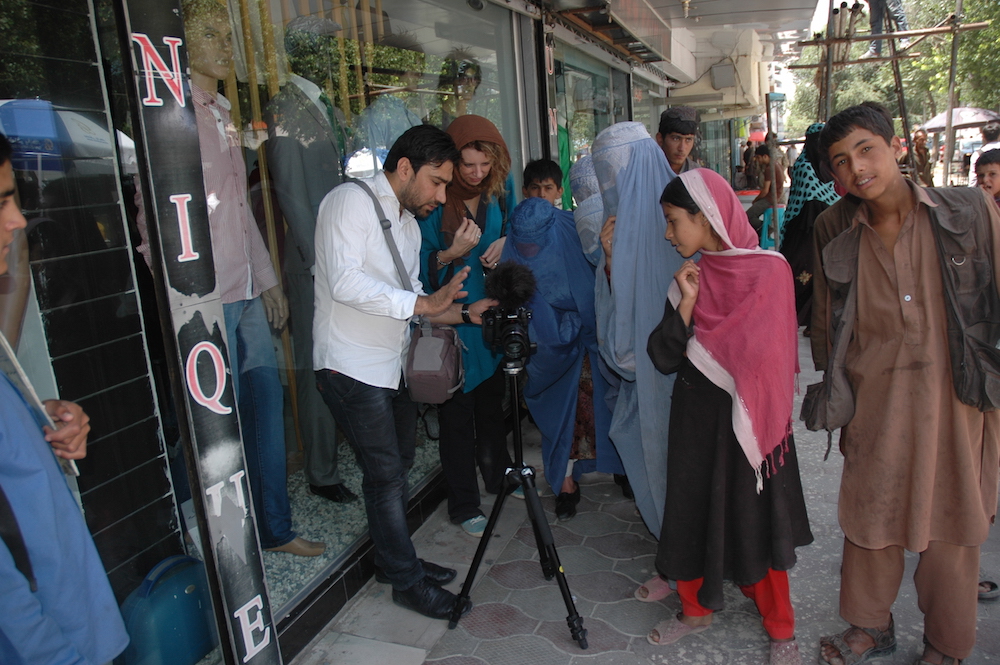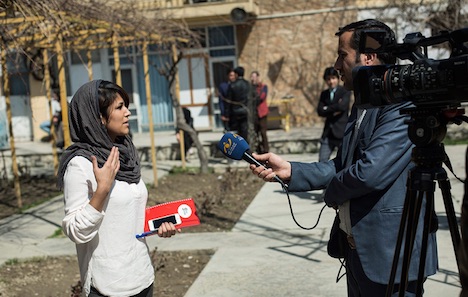You are visiting Liisbeth’s archives!
Peruse this site for a history of profiles and insightful analysis on feminist entrepreneurship.
And, be sure to sign up for rabble.ca’s newsletter where Liisbeth shares the latest news in feminist spaces.

Canadian filmmaker Roberta Staley was so focused on shooting her documentary in Afghanistan that she didn’t think to be afraid about making a film on women’s rights in one of the most misogynist countries in the world. That was until a female Dutch national was kidnapped about 20 metres from her accommodations. “Everyone in my residence was so worried. They didn’t want me to go out,” she says.
But the passionate Staley wasn’t so easily rattled. She bought a burka, figuring that no one would be able to recognize her under the shapeless, tent-like dress. But her fixer, a local assistant, told her not to bother; her tall stature and confident stride would betray her Western roots. So she went back to just covering her head, walked everywhere with a male escort, and took her chances.
That was the summer of 2015. Her documentary Mightier Than the Sword, a film about the rise of Afghan women in the media, was released in June 2017 at Toronto’s Female Eye Film Festival. Since then it has garnered a plethora of juried awards.
The 48-minute film opens with the brutal mob slaying of 27-year-old Islamic scholar Farkhunda Malikzada who was falsely accused of burning the Koran in March 2015. Although the frenzied attack seemed proof that nothing had changed since the Taliban came to power, Afghanistan’s newly vibrant media—staffed in part by women—provoked a national outcry. The movie traces the impact of Malikzada’s murder on the lives of a large cast of female media mavericks including an activist documentarian, a TV talk show host, and a broadcast journalist, all of whom used their public forum to promote gender equality.

Staley’s feminist values were shaped during her childhood years growing up in Calgary. Though her father, a high school art and math teacher, espoused liberal notions, he didn’t necessarily apply them to his own marriage. Staley says her father did not support her homemaker mother in establishing a career and expected food on the table when he came home from work. “It wasn’t a good marriage. She was frustrated and unhappy,” says Staley.
Staley was determined to treasure her own independence and never compromise her dreams. After earning a journalism diploma at Edmonton’s Grant MacEwan University, she became an independent, award-winning writer reporting on the world’s most vulnerable people, including Cambodian land mine victims, South African AIDS patients, and Canadian transgender teenagers. “I’ve always been really sensitive to the disenfranchised,” she says.
Staley conceived Mightier Than the Sword in 2012 while visiting Afghanistan for the first time to write about education and culture for Elle Canada and Trek. One evening she turned on the television and saw a woman anchoring the news. “This was incredible—a miracle,” she says of that moment. At the height of Taliban rule just 11 years earlier, women couldn’t show their faces or even speak in public. Yet here was a female reporter addressing the entire nation.
Staley began to research Afghan women in the media and discovered that the female anchor was not an exception. Since the Taliban were ousted in 2001, Afghan women have risen to leadership roles as journalists, filmmakers, and singers, marshalling the power of media to fight for gender equality. Female politicians have also leveraged publicity to run for—and win—office. Staley thought that this little-known story of progress needed to be heard by Canadians disillusioned by the loss of soldiers’ lives in Afghanistan as well as the monumental expense of Canadian military efforts there. She wanted Canadians to know their sacrifice hadn’t been in vain. “We should celebrate how far women have come because Canada helped to bring this about,” she says.
Then Staley took an unusual step: she chose to tell the good-news story through a documentary rather than her usual medium of magazines. A film, she reasoned, would reach a much larger audience and since it would be dubbed into Dari, it would allow Afghans to access their own story. She also thought learning to operate a camera would be a good investment as a print journalist. “In this day and age, all journalists need to expand their skills,” she says. “Visual storytelling is becoming a key way to disseminate ideas.”
But embarking on her first film without any formal training took all the courage she could muster. “It was a huge risk, but I decided I would do anything it took to get this done,” she says. The first challenge was to raise $80,000. Staley didn’t even bother approaching banks or venture capitalists knowing they would not finance an untried filmmaker. Instead, she mounted a 40-day Indiegogo campaign that raised $2,500, dipped into her savings, and remortgaged her condo. Staley also received a $6,000 grant from Simon Fraser University where she had returned to school to pursue a master in liberal arts (the documentary became her final project for the degree). “SFU cared about the film’s message because it explored many different issues we had studied, including Immanuel Kant’s equality theory and Mary Wollstonecraft’s A Vindication of the Rights of Women,” she says.
Staley regards the huge personal cost of financing the film philosophically. “It was an investment in myself,” she says. “I basically went to film school by doing this.” The opportunity to profile three fearless protagonists, says Staley, made her economic sacrifice worthwhile. “The brave women in the doc are fighting tooth and nail for their rights.”
One is Sahar Fetrat, a documentary filmmaker Staley had heard about on her 2012 visit to Afghanistan during a meeting at Young Women for Change, a Kabul-based non-profit organization dedicated to improving the lives of women. At just 17 years of age, Fetrat produced a documentary on street harassment called Do Not Trust My Silence. Using a hidden camera, the teenager captured the rampant misogyny in the country as men yelled obscenities and threats at her while she walked through Kabul.

After Staley returned home, she researched other female Afghan media “heroines” and soon discovered Shakila Ibrahimkhalil, a television journalist famous for her daring denunciations of political corruption and domestic violence.
With more sleuthing, Staley found her third profile subject, Mozhdah Jamalzadah, the Afghan-born singer and broadcast journalist, who also lived in Vancouver. Jamalzadah had hosted a talk show in Kabul inspired by Oprah’s show, tackling taboo subjects such as child abuse and divorce. While her show catapulted her into stardom, it also brought her death threats, forcing her to flee back to the safety of Canada.
Staley’s determination to tell the stories of these women’s fight against misogyny pushed her through many obstacles, the major one being that she had never shot film before. She turned to the internet to learn the basics of camera work. Through Canadian Women for Women in Afghanistan, a Calgary-based non-profit organization fighting to end the oppression of Afghan women, Staley met her male fixer, Shuja, who would serve as her bodyguard, interpreter, and cultural aide. Then came the shock of Kabul, with its scorching temperatures and two official languages of Pashto and Dari as well as two Turkic languages to navigate.
Being a woman, of course, didn’t help. In order to get a licence to shoot in Kabul, Staley needed the permission of the police department. But women weren’t allowed in their offices. She had to send her fixer in to obtain necessary permits while she waited outside in the blazing sun. As she walked beside her protective assistant, one male teenager tried to intimidate Staley, shouting comments in Dari that were so rude her fixer refused to translate. But quitting the project was never an option. “I was so determined to finish, to create something that honoured and respected the women I interviewed,” she says. “I had to see it through for them.”
Staley’s protagonists were just as committed to making the project a success. They helped choose settings and scenes for the film. “It was quite collaborative,” she says. In one instance, Jamalzadah, the talk show host, invited the crew to film backstage at her music concert. And Staley never forced her own choices on her subjects. “In Afghanistan, it can be dangerous for them to go outside their comfort zone,” she says. For example, Staley was advised to interview a female politician indoors where she could rely on her bodyguard for protection.
Staley was equally diplomatic in dealing with her all-male camera crew and fixer. Knowing that many men there are unaccustomed and even loathe to work with women, she paid them Canadian-level salaries and treated them with the utmost courtesy. “They probably had more respect for women after working with me,” says Staley.
Since shooting Mightier Than the Sword, Staley has become even more committed to the battle for gender equality. “The women in the film amaze me. They never give up fighting for women’s rights,” she says. “They’ve made me more of a warrior.”
After coming home to Vancouver, she joined Sahar Speaks, an Afghanistan-based international organization founded in 2014 that is dedicated to mentoring emerging Afghan women journalists. She finds the work gratifying. “When I see a story that I helped someone publish, I feel like I’ve given birth,” she explains.
Staley hopes the media crusaders in her own film will inspire women in both Afghanistan and Canada. “What the women in the documentary say is so powerful. I think it will help other females look to them as role models,” she says.
It appears that Staley has accomplished that with Canadian audiences who have seen her documentary. “[Staley] does a wonderful job of letting these remarkable people tell their own stories,” says Eva Busza, vice president of the Asia Pacific Foundation of Canada. “As Canada sets out to be a leader in promoting women’s rights at home and around the world, we should be inspired by the passion and commitment of those on the front lines of the struggle in places like Afghanistan.”
Staley’s movie has also impressed jurors at multiple festivals, winning Best Canadian Documentary at the 2017 Female Eye Film Festival. “Staley’s film conveyed the strongest message for women,” says Leslie Ann Coles, the festival’s executive director. The film was also nominated for Best Investigative Documentary at the Regina International Film Fest and Best Direction and Screenwriting (Short Documentary) by the Motion Picture Arts and Sciences Foundation of British Columbia. It has also played at the La Femme International Film Festival in Los Angeles and at universities in Vancouver and Kabul.
Staley submitted the documentary to the Afghanistan International Human Rights Film Festival (slated for March 24–30, 2018, in Kabul) and is waiting to hear if it has been accepted. She hopes her film will contribute to the debate on gender equality in Afghanistan. “What the women in the doc say is so powerful, I really think it will show Afghan men what they’re capable of,” says Staley.
As a result of the buzz, Staley was able to secure a distributor to bring the film to libraries, universities, and schools. She has also been invited to co-direct another documentary about women reporters covering Afghanistan’s national election in 2019 and she even clinched a publishing deal with Greystone Books to write the life story of one of her film’s heroines, Mozhdah Jamalzadah. She hopes to generate enough revenue from these ventures to pay off the debt she incurred making her documentary and to fund future ventures.
But Staley says the real payback is seeing her Afghan subjects get international attention for their efforts in making women’s lives better. “Films can’t make them safer or send them to school,” says Staley. “But just the fact that someone has your back, even if they’re in another part of the world, hopefully gives them strength.”
You are visiting Liisbeth’s archives!
Peruse this site for a history of profiles and insightful analysis on feminist entrepreneurship.
And, be sure to sign up for rabble.ca’s newsletter where Liisbeth shares the latest news in feminist spaces.







One reply on “A Canadian Crusader in Kabul”
Way to go Roberta, its been years since we took the UBC course on writing historical fiction.I look forward to seeing your documentary.
Not yet Kabul but just got back from 9 days on the upper Amazon. Thirty years since I was last in the Iquitos area; those were the times of the Shining Path and in the Amazon area the Tappa Amuro.